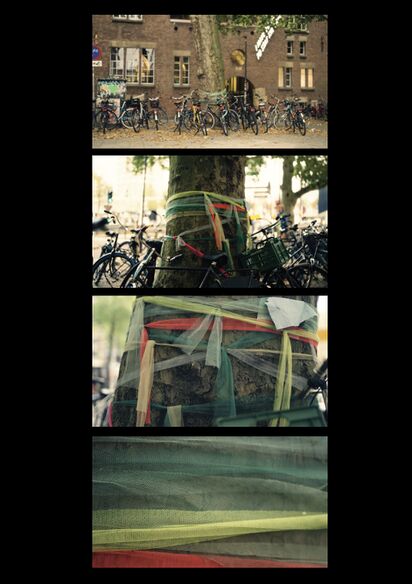Te - Thesis Outline
Draft 23 Oct
Thesis Outline
INTRO
- The starting point of my graduation project.
- How can the thesis support/relate/expand/ intertwine with my graduation research?
- The questions I aim to discuss in the graduation project.
Since I was young, I wondered how far I could go from my hometown. My odyssey began in September last year when I moved from Thailand to the Netherlands for this Master. It’s pretty far, over 9,000 kilometers. Predictably, I have traversed great physical and cultural distances. Everything seemed new except the massive tree in front of the school. It would probably not have caught my attention if colored meshes didn’t wrap it. In Thailand, people believe that it is a symbol indicating that there is a guardian spirit inside. People worship these trees by praying and offering food and beverages to the guardian spirits. I don’t know exactly who is the first person who rubs their fingers with the tree bark. But it was believed that the lucky numbers would appear on the bark if you did that—a shortcut to potential wealth through lottery winnings. This superstition serves as a glimmer of hope, particularly for people in rural areas, offering a chance to secure their livelihoods without comprehensive government support. I never did that in Thailand. But isn’t it fun to try it here?
I could move country, but I can’t never be Thai.
My fascination with mystical tales from my country ignited me to take this encounter as the starting point of my last year's project, which will develop into the graduation project.
……
For my thesis, I intend to write a narrative blend with a report on my research and practice, structured into three sections. This investigation seeks to deepen my understanding of the political connotation behind Thailand's deep-rooted superstitious beliefs and archetypes as well as discuss the following questions.
- Why does Thailand have rich superstitious beliefs? And what is their significance?
- What lies behind Thailand's deep-rooted superstitious beliefs and rituals that may appear perplexing at first glance?
- How do these beliefs impact the political landscape, particularly among marginalized segments of society?
- What are the profound meanings of the symbols in these rituals?
- How can the collective memories of the Thai people be explored through the medium of Thai media?
- How can I construct a piece of work using collective memories?
- What can I achieve by using fake characters in my Mockumentary genre work, and how does this connect to my fascination with superstitious beliefs?
Chapter 1: Framework/Field of Research: Thailand's deep-rooted superstitious beliefs
I want to use superstitious belief as the first door to discuss inequality in various aspects of Thailand.
1.1 Examples of Thailand's deep-rooted superstitious beliefs and rituals associated with societal structure.
1.2 What lies behind Thailand's deep-rooted superstitious beliefs and rituals that may appear perplexing at first glance?
1.3 The impact of political connotation? Especially on marginalized people in society.
1.4 Mundane objects and symbols used in the superstitious ritual.
1.5 Relation between superstition belief and nature.
Chapter 2: Research on case studies of the media
2.1 Examples of songs, music videos, films, TV shows, and news that reveal a value associated with superstitious beliefs.
2.2 Examples of character archetypes in Thai and non-Thai films, especially American films. (Even though Thailand has never been officially colonized by any country. But during the Vietnam War, Thailand became a US Military base. American pop culture also became Thai mainstream culture in the 1970s ever since.)
Chapter 3: My practice / Process / Translation / Constructing work / Mockumentary Genre
3.1 How can I translate notions of superstitious belief into a Mockumentary?
3.2 How can I create the subversive fairy tale/myth based on/using superstition as a theme?
3.3 What opportunities arise when I employ the 'unreliable narrator' technique in constructing my storyline within the Mockumentary genre?
3.4 What is my position? What drives my fascination with superstition, even though I don't personally rely on them in my everyday life?
Reference
Cornwel-Smith, P. (2014) Very Thai: Everyday popular culture. Bangkok: River Books.
Paramaditha, I. (2019) Apple and Knife. London: Vintage Publishing.
Murch, W. (2001a) In the blink of an eye: A perspective on Film editing. 2nd edn. Los Angeles: Silman-James Press.
The Mock Doc Film Series: History of the Mockumentary Film, Victoria Napolitano
F Is for Phony: Fake Documentary and Truth’s Undoing, 2006, Alexandra Juhasz and Jesse Lerner, editors.
Fisher, M. and Ambrose, D. (2018) K-Punk: The collected and unpublished writings of Mark Fisher (2004-2016). London: Repeater Books.
Reconstructing Reality, Alice Wong

